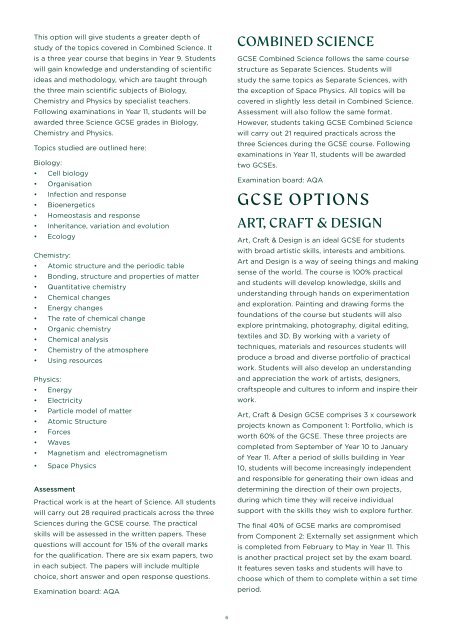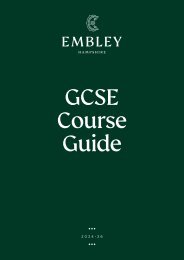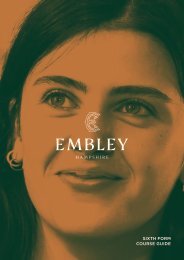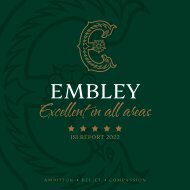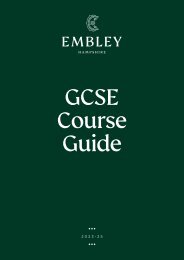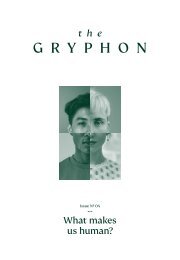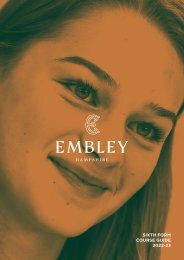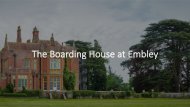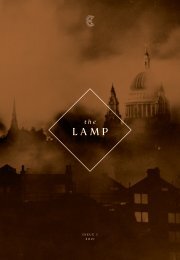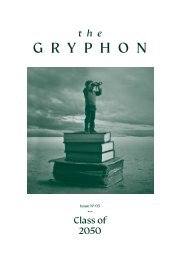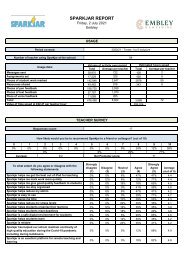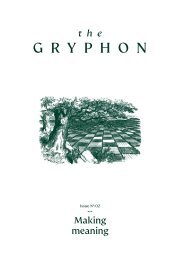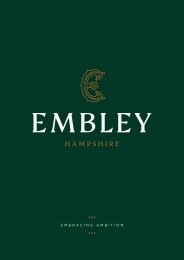Embley's GCSE Course Guide
Create successful ePaper yourself
Turn your PDF publications into a flip-book with our unique Google optimized e-Paper software.
This option will give students a greater depth of<br />
study of the topics covered in Combined Science. It<br />
is a three year course that begins in Year 9. Students<br />
will gain knowledge and understanding of scientific<br />
ideas and methodology, which are taught through<br />
the three main scientific subjects of Biology,<br />
Chemistry and Physics by specialist teachers.<br />
Following examinations in Year 11, students will be<br />
awarded three Science <strong>GCSE</strong> grades in Biology,<br />
Chemistry and Physics.<br />
Topics studied are outlined here:<br />
Biology:<br />
• Cell biology<br />
• Organisation<br />
• Infection and response<br />
• Bioenergetics<br />
• Homeostasis and response<br />
• Inheritance, variation and evolution<br />
• Ecology<br />
Chemistry:<br />
• Atomic structure and the periodic table<br />
• Bonding, structure and properties of matter<br />
• Quantitative chemistry<br />
• Chemical changes<br />
• Energy changes<br />
• The rate of chemical change<br />
• Organic chemistry<br />
• Chemical analysis<br />
• Chemistry of the atmosphere<br />
• Using resources<br />
Physics:<br />
• Energy<br />
• Electricity<br />
• Particle model of matter<br />
• Atomic Structure<br />
• Forces<br />
• Waves<br />
• Magnetism and electromagnetism<br />
• Space Physics<br />
Assessment<br />
Practical work is at the heart of Science. All students<br />
will carry out 28 required practicals across the three<br />
Sciences during the <strong>GCSE</strong> course. The practical<br />
skills will be assessed in the written papers. These<br />
questions will account for 15% of the overall marks<br />
for the qualification. There are six exam papers, two<br />
in each subject. The papers will include multiple<br />
choice, short answer and open response questions.<br />
Examination board: AQA<br />
COMBINED SCIENCE<br />
<strong>GCSE</strong> Combined Science follows the same course<br />
structure as Separate Sciences. Students will<br />
study the same topics as Separate Sciences, with<br />
the exception of Space Physics. All topics will be<br />
covered in slightly less detail in Combined Science.<br />
Assessment will also follow the same format.<br />
However, students taking <strong>GCSE</strong> Combined Science<br />
will carry out 21 required practicals across the<br />
three Sciences during the <strong>GCSE</strong> course. Following<br />
examinations in Year 11, students will be awarded<br />
two <strong>GCSE</strong>s.<br />
Examination board: AQA<br />
<strong>GCSE</strong> OPTIONS<br />
ART, CRAFT & DESIGN<br />
Art, Craft & Design is an ideal <strong>GCSE</strong> for students<br />
with broad artistic skills, interests and ambitions.<br />
Art and Design is a way of seeing things and making<br />
sense of the world. The course is 100% practical<br />
and students will develop knowledge, skills and<br />
understanding through hands on experimentation<br />
and exploration. Painting and drawing forms the<br />
foundations of the course but students will also<br />
explore printmaking, photography, digital editing,<br />
textiles and 3D. By working with a variety of<br />
techniques, materials and resources students will<br />
produce a broad and diverse portfolio of practical<br />
work. Students will also develop an understanding<br />
and appreciation the work of artists, designers,<br />
craftspeople and cultures to inform and inspire their<br />
work.<br />
Art, Craft & Design <strong>GCSE</strong> comprises 3 x coursework<br />
projects known as Component 1: Portfolio, which is<br />
worth 60% of the <strong>GCSE</strong>. These three projects are<br />
completed from September of Year 10 to January<br />
of Year 11. After a period of skills building in Year<br />
10, students will become increasingly independent<br />
and responsible for generating their own ideas and<br />
determining the direction of their own projects,<br />
during which time they will receive individual<br />
support with the skills they wish to explore further.<br />
The final 40% of <strong>GCSE</strong> marks are compromised<br />
from Component 2: Externally set assignment which<br />
is completed from February to May in Year 11. This<br />
is another practical project set by the exam board.<br />
It features seven tasks and students will have to<br />
choose which of them to complete within a set time<br />
period.<br />
6


